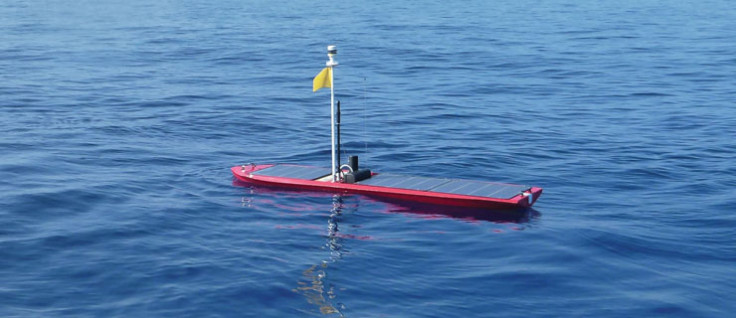Robotic Sea Power: New Liquid Robotics Wave Glider Can Survey Ocean Floor, Monitor Fish Populations, Guard Borders

Robots are already on the march on the ground and in the air. Why not add some sea power into the mix?
There are already some prototypes of robots that can swim like people. Robotic fish are being developed that can sense small disturbances in water flow and adjust their path accordingly. There’s a salamander-like robot that can transition from swimming to walking with a flick of its bike chain-like spine. None of these are yet available on a broad commercial scale though.
The latest front of the aquatic robot revolution is a little less flashy than a chrome fish -- it’s a 9.5-foot-long float that looks like a thick surfboard, anchored to an underwater sub that’s a little more than six feet long. But the really impressive thing about this robot, its maker says, is the devices it’s packing, which make it attractive to scientists, fisheries, oil companies and governments alike.
California's Liquid Robotics unveiled its latest oceangoing robot on Monday: the Wave Glider SV3, a machine that harvests both wave and solar energy for its propulsion. It builds upon a previous platform model that set a world record for longest distance traveled at sea by an unmanned device last December -- 9,000 nautical miles, from San Francisco to Australia. The robot is also an aquatic data center, able to collect, process and transmit the data while at sea.
The processing part is key. Since Liquid Robotics' Wave Gliders can stay out on the water for up to a year or more at a time, they have to be able to separate the signal from the noise.
“You don’t want to send back three months of wave video; you want to send back ‘I saw something that wasn’t a wave,’” Liquid Robotics CEO Bill Vass said in a phone interview.
Each little robot can be customized with a variety of different sensor modules. The robot can be kitted out to measure the temperature and the salinity of the ocean around it, look at features on the ocean floor, detect oil leaks or toxic algal blooms and sense magnetic fields, just to name a few functions. Liquid Robotics also expects to have a module soon that can scoop up microorganisms in seawater, break them down and sequence the DNA.
All these options, Vass said, make the company’s robots adept at a wide range of tasks.
“Say I want to know what the status of the fish population is so I can issue licenses,” Vass said. “Or: What’s the status of my ocean-floor mine? Where’s the oil so I can find it? Where should I put my oil rig? Who’s coming in and out of my borders? Those are the kind of answers people look for.”
Liquid Robotics clients aren’t actually buying the little sea-going drones.
“If an oil company says they need to survey for a pipeline, they meet with a mission planner to lay out that mission,” Vass said. “The robot can self-navigate to that position, do the work, process the data, and it’s all monitored 24 hours a day.”
While the robot is smart enough to deal with many obstacles and to navigate within a certain preprogrammed range, its navigational systems can get overwhelmed if, say, it strays into the path of too many ships at once. But the company’s robot handlers are just a phone call away, and, if it needs help, the robot can dial the number.
The bottom line is that the semi-autonomous Wave Glider is more environmentally friendly than a fossil-fuel-powered scout boat or research vessel -- and cheaper, too. Whereas an oil company might spend about $155,000 per day on a scout boat, Vass said Liquid Robotics strives to deliver aquatic surveying for about a tenth of that cost. Oil companies, marine biologists and certain governments (Vass couldn’t specify which ones exactly) are already signing up.
Overall, though, the robot really isn’t the product, Vass said.
“The Wave Glider’s cool and very interesting, but that’s not really what it's about. The delivery of the answer the customer needs is our product. This was intended to answer big, expensive questions for customers.”
© Copyright IBTimes 2024. All rights reserved.





















